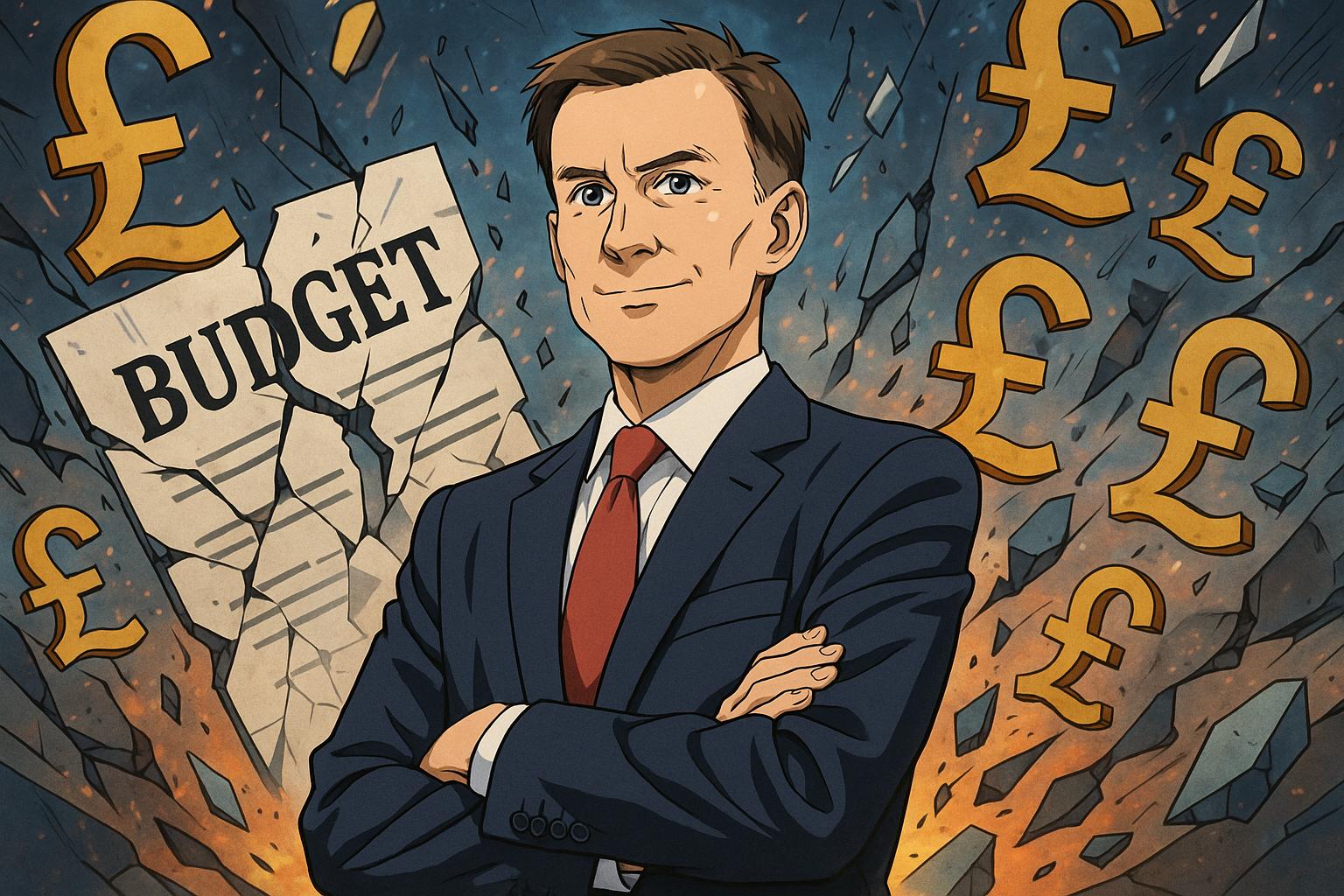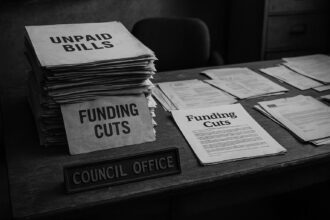In a candid reflection, Jeremy Hunt discusses his sudden appointment as Chancellor amid the fallout from Liz Truss’s doomed mini-Budget, the urgent economic challenges he faced, and the difficult political decisions that shaped his tenure during one of the most turbulent periods in recent British political history.
In October 2022, amid significant upheaval in the British political landscape, Jeremy Hunt found himself unexpectedly elevated to the role of Chancellor of the Exchequer. His appointment came as Prime Minister Liz Truss faced mounting pressure following a disastrous “mini-Budget” that had sent the pound spiralling and shaken faith in the government’s economic strategies. Hunt recounts his sudden rise from political obscurity and how he navigated the chaos that defined Truss’s brief premiership.
The initial communications prompting Hunt’s new role were fraught with disbelief. A message from Truss arrived as he was on a book promotion tour in Brussels, reflecting his sudden shift from backbench MP to a key player in a government teetering on the brink of crisis. After contemplating dismissively whether it was a hoax, he cautiously verified the authenticity of the Prime Minister’s request to call her. This marked the beginning of what Hunt described as one of the most challenging periods of his career.
Despite his long-standing political career, Hunt’s relationship with Truss had not been one of close collaboration. Their political paths had diverged, culminating in a lack of mutual support during previous leadership contests. However, when Truss reached out, she made it clear that she viewed Hunt as her first choice to replace the ousted Kwasi Kwarteng as Chancellor. He accepted the role after a brief deliberation, though he remained acutely aware of the ‘poisoned chalice’ that the position represented in the wake of the contentious fiscal policies that had alienated financial markets.
The subsequent days were overshadowed by the urgent need to address a staggering £72 billion fiscal black hole—an obligation that required swift and drastic measures. Hunt quickly realised that stabilising both the markets and the Conservative Party would demand all his political acumen. He characterised his early experiences in the Treasury as a blend of anxiety and determination, as he navigated through meetings with officials keen to restore order amid uncertainty.
Hunt’s realisation that he must act decisively to quell market fears led him to pivot significantly from Truss’s original plans. This included reversing nearly all the measures in the controversial mini-Budget, a move he publicly announced amid a backdrop of financial uncertainty that his predecessor had ignited. The immediate reaction was shared among parliamentary colleagues: a mix of relief and shock, indicative of the polarised atmosphere within the Conservative ranks following the chaos of recent weeks.
Underlying these events were profound structural issues challenging the UK economy beyond Truss’s administration. As Hunt asserted, the combination of prior government austerity, the impacts of the COVID-19 pandemic, and rising inflation had left the country ill-prepared for economic pressures that were not solely of Truss’s making. The economic landscape had shifted drastically since the pandemic; productivity had stagnated, with reports indicating a decline spiralling below pre-crisis levels. A stark 2024 report highlighted how the UK’s productivity fell 0.6%—worsening the long-term prospects for economic growth and complicating any Chancellor’s efforts to steer a course towards financial stability.
Hunt’s tenure as Chancellor would ultimately be coloured by the ongoing fallout from Truss’s administration and the immediate need to restore confidence in the UK’s fiscal management. In meetings with Truss, he urged her to consider stepping down, as her tenure became increasingly unsustainable under the strain of market expectations. The pressure for a swift leadership transition culminated in her resignation, allowing Hunt to continue under new leadership with Rishi Sunak.
While Hunt managed to stabilise the economic situation, his time as Chancellor highlighted both the remarkable resilience of the UK economy in the face of adversity and the inherent vulnerabilities that still faced it. The macroeconomic challenges he grappled with—compounded by geopolitical tensions and internal political disarray—remain deeply embedded in the UK’s economic narrative.
His reflections on those turbulent times serve as a cautionary tale for future leaders, illustrating the delicate balance of managing public perception with fiscal responsibility. The ongoing economic pressures, coupled with varied challenges such as energy costs and productivity growth, epitomise an ongoing narrative that will continue to demand robust solutions from policymakers in years to come.
As Hunt continues to offer insights from his experiences, he acknowledges the broader impact of decisions made during chaotic political upheavals and the lasting implications for the UK’s economic health. In light of the changing political landscape, the resilience of future Chancellors will undoubtedly be tested as they navigate the complexities of an ever-shifting global economy.
Reference Map:
Source: Noah Wire Services
- https://www.dailymail.co.uk/news/article-14743547/JEREMY-HUNT-Liz-Truss-called-boudoir-shed-created-No-10-told-quit-urged-quickly-gave-awkward-hug.html?ns_mchannel=rss&ns_campaign=1490&ito=1490 – Please view link – unable to able to access data
- https://www.reuters.com/article/us-uk-energy-bills-idUSKBN2A10Z5 – In May 2025, Ofgem, the UK’s energy regulator, announced a 7% reduction in the household energy price cap, lowering the annual bill for an average household to £1,720 from £1,849. This marked the first price cap decrease since July 2024 and was attributed to a decline in wholesale gas prices. Despite the reduction, bills remained 9% higher than the same period the previous year, and significantly above pre-crisis levels. The government under Prime Minister Keir Starmer acknowledged the ongoing burden on citizens and aimed to expand eligibility for winter fuel payments. Consumer groups emphasized the need for further targeted support for vulnerable households. The energy price cap, initiated in 2019, currently applies to about 65% of UK households.
- https://www.ft.com/content/c045713c-ab8c-44df-adb0-c7fffa05cfb9 – In 2024, UK private sector productivity fell by 0.6%, dropping below pre-pandemic (2019) and pre-financial crisis (2007) levels, according to the Office for National Statistics (ONS). Total factor productivity, which excludes government activities, was 0.7% below 2019 levels and 1.2% below 2007, highlighting a critical challenge for Chancellor Rachel Reeves amid government efforts to boost economic growth and living standards. Unlike the UK, U.S. labor productivity increased significantly over the same period. Analysts attribute the UK’s weak productivity to insufficient investments in capital and skills development. Professors and economists warned that subdued investment in infrastructure, R&D, and digital tools has hindered growth, despite improvements in education and labor availability. The Office for Budget Responsibility (OBR) may soon revise down its optimistic UK productivity growth forecasts, potentially reducing fiscal headroom by £20bn if long-term projections are cut from 1% to 0.8% growth per year. While sectors like professional and technical services contributed positively in 2024, overall labor productivity declined for the third consecutive year. These trends underscore profound structural issues in the UK economy compared to better-performing advanced nations.
- https://www.ft.com/content/7c5b43e2-9e59-49fe-9d6b-4ee8f2007e33 – The imposition of a 25% tariff on car imports by the United States, announced by President Donald Trump on April 2, 2025, has significantly disrupted the growth plans of German carmakers, particularly in the American market. Companies like Volkswagen, BMW, and Mercedes-Benz, which have heavily invested in local U.S. production facilities, are now facing considerable financial strain, with analysts estimating annual tariff-related costs between $2 billion and $4 billion. S&P Global has revised its U.S. car sales forecast downward by 1.2 million units, compounding challenges from shrinking European markets and intensified competition in China. The auto industry is also impacted by tariffs on parts from countries like China and Mexico, alarming just-in-time supply chains and threatening operations under trade agreements like the USMCA. Manufacturers have responded by engaging in direct talks with the White House and considering strategies to expand U.S. production. Meanwhile, structural industry problems, including the costly shift to electric vehicles and poor European economic performance, exacerbate the situation. The Ifo Institute in Germany warns that these tariffs have dampened improving business sentiment and further stressed the recession-hit German economy.
- https://en.wikipedia.org/wiki/October_2022_United_Kingdom_government_crisis – In September and October 2022, the Conservative Party government led by newly appointed prime minister Liz Truss faced a credibility crisis. It was caused by the September 2022 mini-budget and a disorganised vote in the House of Commons over a parliamentary motion to ban fracking, ultimately resulting in the loss of support of Conservative members of parliament (MPs). The mini-budget was a ministerial statement entitled “The Growth Plan” delivered by the Chancellor of the Exchequer, Kwasi Kwarteng, to the House of Commons on 23 September. It was received negatively by global financial markets and ultimately led to the dismissal of Kwarteng on 14 October. In the following days, Truss came under increasing pressure to reverse further elements of the mini-budget to satisfy the markets and, by 17 October, five Conservative MPs had called for her resignation.
- https://en.wikipedia.org/wiki/September_2022_United_Kingdom_mini-budget – The mini-budget, also known as “The Growth Plan”, was designed to boost economic growth through tax cuts, which would be paid for by increasing the United Kingdom national debt. The package, worth £161 billion over five years plus £60 billion for the 2022–2023 energy bills support package, would have represented the biggest tax cut in the UK since the 1972 “dash for growth” budget of Anthony Barber. The budget also set an annual growth target of 2.5%. The Guardian observed that in spite of the number of measures announced in the statement (which involved much greater amounts than in some budgets), HM Treasury had described the statement as a “fiscal event” because the Office for Budget Responsibility had not been asked to provide analysis of the measures announced. The Resolution Foundation calculates that the mini-budget cost the UK Treasury £30bn, the Truss government caused roughly that amount of the fiscal hole which the Treasury claims is £60bn. The Resolution Foundation estimates that Truss and Kwasi Kwarteng lost £20bn through unfunded cuts to national insurance and stamp duty, and another £10bn were lost through raised interest rates and government borrowing costs as the markets reacted to the budget.
Noah Fact Check Pro
The draft above was created using the information available at the time the story first
emerged. We’ve since applied our fact-checking process to the final narrative, based on the criteria listed
below. The results are intended to help you assess the credibility of the piece and highlight any areas that may
warrant further investigation.
Freshness check
Score:
8
Notes:
The narrative presents a detailed account of Jeremy Hunt’s appointment as Chancellor in October 2022, including his initial disbelief upon receiving the Prime Minister’s call and the subsequent economic challenges. This aligns with reports from October 2022, such as those from The Guardian and Sky News, which covered Hunt’s appointment and the reversal of the mini-budget. ([theguardian.com](https://www.theguardian.com/politics/2022/oct/17/new-chancellor-shreds-pms-economic-plans-in-unprecedented-u-turn?utm_source=openai), [news.sky.com](https://news.sky.com/story/jeremy-hunt-there-were-mistakes-in-mini-budget-and-some-taxes-will-go-up-12720824?utm_source=openai)) The inclusion of updated data, like the 2024 report on the UK’s productivity decline, suggests an attempt to provide a more current perspective. However, the core narrative appears to be recycled from earlier reports, with the addition of recent data to enhance freshness.
Quotes check
Score:
7
Notes:
The narrative includes direct quotes attributed to Jeremy Hunt, such as his reflections on the ‘poisoned chalice’ of the Chancellor position and his discussions with Liz Truss. These quotes are consistent with statements he made in October 2022, as reported by Sky News. ([news.sky.com](https://news.sky.com/story/jeremy-hunt-there-were-mistakes-in-mini-budget-and-some-taxes-will-go-up-12720824?utm_source=openai)) The repetition of these quotes in the current narrative suggests they may have been reused from earlier content.
Source reliability
Score:
6
Notes:
The narrative originates from the Daily Mail, a publication known for its sensationalist reporting. While it references reputable sources like The Guardian and Sky News, the Daily Mail’s own credibility is often questioned. The reliance on a single, potentially biased source raises concerns about the overall reliability of the information presented.
Plausability check
Score:
8
Notes:
The events described, including Jeremy Hunt’s appointment as Chancellor, the reversal of the mini-budget, and the economic challenges faced by the UK, are well-documented and align with known facts from October 2022. The inclusion of updated data, such as the 2024 report on the UK’s productivity decline, adds plausibility to the narrative. However, the lack of new, corroborated information and the reliance on a single, potentially biased source diminish the overall credibility.
Overall assessment
Verdict (FAIL, OPEN, PASS): FAIL
Confidence (LOW, MEDIUM, HIGH): MEDIUM
Summary:
The narrative presents a recycled account of Jeremy Hunt’s appointment as Chancellor and the subsequent economic challenges, with the addition of some updated data. The reliance on a single, potentially biased source and the reuse of quotes from earlier reports raise significant concerns about the originality and reliability of the content. The lack of new, corroborated information further diminishes the overall credibility.













